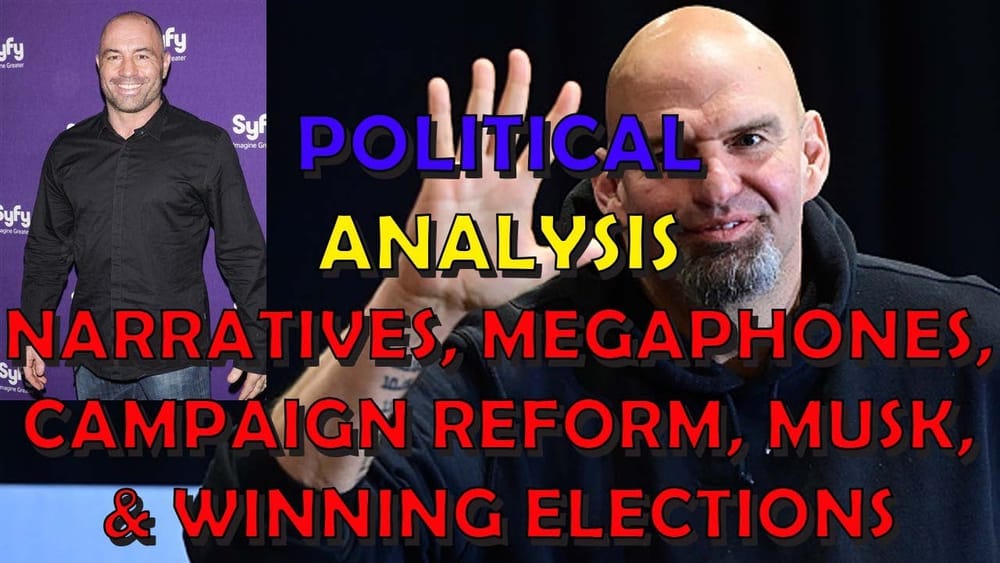Politics Extra: Narratives, Megaphones, Campaign Reform, Musk and Winning Elections
Table of Contents 📖
"In order for an electorate to have a free and fair election, I think there needs to be good political education. And I think our electorates are not wise enough as to what politics is, what it means, and how it affects their lives."
Hello Team
🎦 00:00-00:12⏩
In this video, Jonathan introduces the topics he will be covering: political communication, campaign reform in the UK, the absence of such regulation in the US, and the implications of these issues. He mentions that he will discuss how money can influence political outcomes, particularly highlighting Elon Musk's recent announcement of a £100 million donation to Nigel Farage's Reform Party. He briefly touches upon the role of platforms like Twitter in spreading misinformation and shaping narratives.
Return to top⤴️
Elon Musk's £100 Million Donation to Reform UK
🎦 00:13-00:30⏩
Jonathan discusses the implications of Elon Musk's planned £100 million donation to Reform UK, a for-profit corporation, not a political party. He points out that the UK currently lacks the legal framework to deal with such large foreign donations outside the restricted campaign period. This loophole allows Musk to potentially influence UK politics significantly. Furthermore, Musk's ownership of Twitter provides him with a platform to disseminate both information and misinformation, enabling him to control narratives, as seen in his attempts to influence the German elections.
Return to top⤴️
Elon Musk's Involvement in UK Politics and Support for Far-Right Figures
🎦 00:31-00:47⏩
Jonathan focuses on Elon Musk's increasing involvement in UK politics, particularly his support for the Reform Party and far-right figures like Tommy Robinson. Musk's claim that "only reform can save Britain" and his call for a new election highlight his active interference. Jonathan criticizes a poll cited by a pro-Brexit, anti-socialist Twitter user, which suggested a collapse in support for the Labour government. He points out that this poll, used by Conservative MP Kemi Badenoch in the House of Commons, was flawed as half of those polled were from Belize. This example underscores the manipulation of narratives and the need for scrutiny of such surveys.
Return to top⤴️
Mainstream Media vs. Social Media in Political Campaigns
🎦 00:48-01:04⏩
Jonathan delves into the challenges major political parties face in controlling narratives in the age of social media. He contrasts mainstream media with platforms like Twitter, which Elon Musk claims is the biggest source of news. Jonathan clarifies that Twitter is an aggregator rather than a news source, often hosting mainstream media content. He points out that the Democratic Party and the Labour Party have struggled with adapting to new media, unlike Elon Musk, who effectively uses social media to propagate his views. Jonathan uses the example of Tommy Robinson, a far-right activist, to illustrate how Musk manipulates narratives to his advantage.
Return to top⤴️
Elon Musk's Promotion of Far-Right Narratives and Tommy Robinson
🎦 01:04-01:27⏩
Jonathan provides context on Tommy Robinson's legal troubles to counter Elon Musk's portrayal of him as a political prisoner. Robinson, the founder of the English Defence League, was jailed for contempt of court after spreading misinformation about a Syrian refugee, Jamal, who was attacked at school. Despite court orders, Robinson continued to make false accusations, leading to threats against Jamal and his family. Jonathan explains that Robinson's imprisonment was due to his repeated violation of court orders, not for "telling the truth" as Musk claims. Jonathan emphasizes the danger of Musk's actions, given his considerable influence, and condemns his support for far-right narratives.
Return to top⤴️
Campaign Finance Reform and the Influence of Money in UK Politics
🎦 01:27-01:48⏩
Jonathan discusses the urgent need for campaign finance reform in UK politics, contrasting it with the relatively better regulations in the US. He highlights a discussion between Alastair Campbell, former spin doctor for Tony Blair, and Rory Stewart, a former Conservative MP. They agree that allowing an American citizen like Elon Musk to donate £100 million to a UK political party is unacceptable and could drastically skew election outcomes. Jonathan emphasizes that UK elections are typically low-cost, and the influx of large sums of money could undermine the democratic process, similar to the issues raised by the Citizens United case in the US.
Return to top⤴️
Elon Musk as a Fascist Threat
🎦 01:48-02:00⏩
Rory Stewart's assertion that Elon Musk is a "genuine fascist" is highlighted. Jonathan elaborates on Musk's endorsements of far-right parties and figures, such as the Alternative for Germany (AfD), Reform UK, and Tommy Robinson. These actions, coupled with Musk's previous endorsement of a Belgian neo-Nazi, indicate his fascist alignment. Jonathan stresses the danger of Musk's use of social media to promote his agenda, comparing it to the manipulation seen during the Arab Spring. He concludes that Musk's activities pose a significant threat to democratic processes and should not be underestimated.
Return to top⤴️
The Power of Social Media and Elon Musk's Strategy
🎦 02:00-02:17⏩
Jonathan discusses the unprecedented use of social media by Elon Musk to influence political discourse. Musk's backing of policies that restrict his rivals, as seen in California, and his pragmatic approach to business, suggest he will continue to support Trump to advance his interests. The suggestion by Adam Kinzinger that Musk could be seen as "President Musk" with Trump as his "Vice President" underscores Musk's significant influence. Jonathan reiterates the need for restrictions on political donations, even from British citizens, to prevent the undue influence of wealthy individuals on politics.
Return to top⤴️
The Need for State Funding of Political Parties
🎦 02:17-02:35⏩
Jonathan addresses the need to reform party funding to prevent the influence of hedge funds, oligarchs, and trade unions. He suggests that moving towards state funding of political parties or imposing strict limits on donations could be a solution, despite the general dislike for such measures. This would prevent wealthy individuals from essentially bribing politicians to make rules in their favour. Jonathan argues that allowing the richest to dictate policy is not true freedom but rather a constraint imposed by the financially well-off, which is detrimental to the general population.
Return to top⤴️
Nigel Farage and the Skirting of Political Regulations
🎦 02:35-02:56⏩
Jonathan references a Politics Joe podcast featuring Lewis Goodall from The News Agents, discussing Nigel Farage's ability to skirt political regulations. Farage often walks up to the line of what is permissible and exploits the unregulated nature of social media to bypass traditional media regulations. Unlike TV, where all parties must be given equal voice, social media allows Farage to directly target voters without such constraints. Jonathan highlights an incident where Farage stoked tensions regarding the Stockport stabbings, spreading misinformation without immediate accountability, a tactic he could not use on regulated television.
Return to top⤴️
The Growing Discrepancy Between Regulated and Unregulated Media
🎦 02:56-03:16⏩
Lewis Goodall and his guest discuss the discrepancy between regulated traditional media and unregulated new media, such as podcasts and YouTube. They argue that the medium of delivery should not dictate the level of regulation. The fact that content on TV is subject to different requirements than content on a phone or YouTube is illogical, especially since YouTube can be watched on TV. This double standard is becoming increasingly problematic as digital media grows and traditional media declines. The speakers emphasize that no politician has yet been willing to address this issue effectively.
Return to top⤴️
Generational Differences in Understanding and Using the Internet
🎦 03:16-03:39⏩
The conversation touches on generational differences in understanding and using the internet. Younger generations have grown up with the internet and are more adept at navigating the digital landscape. In contrast, older generations, including many politicians and media managers, struggle to keep up with the rapid pace of internet evolution. This gap in understanding contributes to the slow adaptation of traditional media and political institutions to the new media environment. The speakers highlight that the rate of turnover in journalism is slow, leading to a lack of innovation and adaptation to digital spaces.
Return to top⤴️
The Asymmetry of Importance Between Traditional and New Media
🎦 03:39-03:57⏩
Lewis Goodall discusses the asymmetry of importance placed on traditional versus new media by political institutions like Downing Street. He notes that while traditional media outlets receive constant engagement from political offices, new media platforms do not receive the same level of attention. This discrepancy highlights a failure to recognize the reach and impact of new media. Goodall argues that if a clip from a podcast or YouTube video travels widely, it can reach far more people than a traditional newspaper article, yet political engagement strategies have not adapted to this reality.
Return to top⤴️
The Need for Politicians to Embrace New Media
🎦 03:57-04:16⏩
Drawing parallels with the US election, the speakers argue that politicians need to embrace new media to effectively communicate their messages. While right-wing figures like Trump and Farage have successfully utilized new media, left-leaning parties like the Democrats have lagged. The discussion emphasizes the importance of engaging with new media platforms and understanding their dynamics to reach a broader audience. Jonathan references Brian Tyler Cohen's critique of the Democrats' failure to harness new media effectively, underscoring the need for political parties to adapt their communication strategies.
Return to top⤴️
Democrats' Focus on Democracy and Communication
🎦 04:16-04:34⏩
Jonathan transitions to a discussion with a Fox News anchor about the Democrats' strategy moving forward. The anchor suggests that Democrats should focus on listening to voters and addressing their concerns directly rather than imposing their values. This involves talking about everyday issues like the price of eggs and letting people vote on their preferred candidates. The critique here is that Democrats have often failed to connect with voters on a personal level, instead of delivering top-down messages that do not resonate with the public's lived experiences.
Return to top⤴️
The Importance of Authentic Communication in Politics
🎦 04:34-04:53⏩
The conversation highlights the need for politicians to communicate authentically and avoid "gaslighting" the public. The example of John Fetterman, known for his straightforward and relatable style, is used to illustrate the appeal of authenticity. In an era where people are bombarded with information, stale talking points from political committees are ineffective. The speakers argue that politicians must address the issues that matter most to people and propose solutions that resonate with their everyday lives. This approach requires a shift from traditional, top-down communication to a more engaging and empathetic style.
Return to top⤴️
Populist Strategies and the Appeal to the Everyman
🎦 04:53-05:12⏩
Jonathan discusses how populist leaders like Nigel Farage and Donald Trump effectively appeal to the working class despite their elite backgrounds. These leaders harness the power of appearing as "everyman" figures, even when their policies do not align with working-class interests. Jonathan questions how these figures manage to engender support from those they should theoretically be at odds with. He points out the contradiction in their appeal, noting that their policies, such as tax cuts for the rich, do not benefit the working class. This segment highlights the effectiveness of their communication strategies in gaining and maintaining support.
Return to top⤴️
The Need for Politicians to Talk Like Normal People
🎦 05:12-05:32⏩
Returning to Lewis Goodall's advice, Jonathan emphasizes the importance of politicians talking like normal people instead of using robotic, scripted language. This aligns with the earlier point about John Fetterman's appeal. Politicians who adopt a performative, overly controlled approach to communication fail to connect with the electorate. The speakers argue that in today's media landscape, authenticity and the ability to tell relatable stories are crucial. Politicians should focus on being genuine and straightforward in their interactions with the public to build trust and engagement.
Return to top⤴️
The Importance of Performance and Authenticity in Politics
🎦 05:32-05:51⏩
Jonathan delves into the performative nature of politics, a game that requires politicians to engage authentically with the public. He criticizes politicians who, despite entering a field that inherently involves performance, fail to connect with voters due to their rigid and inauthentic communication styles. Drawing on historical context, he notes that politics has always involved an element of performance, from ancient Greece to modern democracies and autocracies. He is bewildered by the number of politicians across all parties who struggle to communicate effectively, often sounding robotic and out of touch.
Return to top⤴️
The Need for Relatable and Authentic Political Communication
🎦 05:51-06:17⏩
Jonathan highlights the stark contrast between the controlled, scripted communication style of some politicians and the more relatable, authentic approach of others. He cites examples of political figures who, instead of addressing real issues and engaging with the public, often resort to delivering pre-packaged, uninspired statements. This robotic and repetitive style alienates voters. Jonathan stresses the importance of politicians being able to tell stories and speak normally, without fear of deviating from a script. He argues that authenticity, even if manufactured, is more likely to resonate with the public than a highly controlled, drone-like approach.
Return to top⤴️
Prioritizing Communication Skills in Political Leadership
🎦 06:17-06:37⏩
Jonathan emphasizes the need for political leaders to prioritize communication skills. He suggests that leaders should identify and promote the best communicators within their ranks, regardless of their other governmental duties. Effective communication should be seen as a critical component of political success, not an afterthought. Jonathan criticizes a recent government press release for its robotic and repetitive nature, illustrating how poor communication can undermine a politician's message. He advocates for a more natural, straightforward communication style that can connect with the public on a personal level.
Return to top⤴️
The Insufficiency of Worthy and Progressive Messaging
🎦 06:37-06:56⏩
Jonathan argues that in the current political climate, it is insufficient for centre-left or centre-right parties to rely solely on being "worthy and progressive." He extends this critique to the Democrats in the US, who historically emphasized passing purity tests to appeal to a specific subset of voters. This approach fails to recognize the diversity of views within the electorate. Jonathan contends that to win elections, parties need a broad church that accepts a wide range of viewpoints. Effective communication is essential to sell this inclusive narrative to the public.
Return to top⤴️
Republicans' Control of the Media Landscape and Narrative
🎦 06:56-07:17⏩
Jonathan discusses how the Republicans have effectively controlled the media landscape and narrative, particularly through their dominance in various media spaces. They have leveraged fear-based messaging, focusing on issues like immigration and inflation, to manipulate public perception. This control allows them to disseminate their narrative more convincingly, even if it is not entirely truthful. Jonathan highlights the contrast with the Democrats, who have struggled to counter this narrative due to their lack of investment in and understanding of the new media landscape.
Return to top⤴️
The Importance of a Comprehensive Media Strategy
🎦 07:17-07:35⏩
The conversation underscores the need for a comprehensive media strategy that goes beyond traditional methods. While acknowledging the importance of delivery and policy achievements, Jonathan argues that these efforts are futile if not effectively communicated to the electorate. He references the Biden administration's infrastructure bill and the CHIPS and Science Act as examples of significant achievements that were not adequately communicated to the public. This failure to communicate undermines the perceived success of these initiatives.
Return to top⤴️
The Dual Strategy of Creating and Engaging with Media Ecosystems
🎦 07:35-07:53⏩
Jonathan emphasizes the dual strategy of creating a new media ecosystem while also engaging with existing ones. He highlights the importance of interacting with potentially critical platforms to influence public opinion. The example of Bernie Sanders appearing on Joe Rogan's podcast is used to illustrate this point. By engaging with diverse media spaces, politicians can reach a broader audience and shape the narrative more effectively. This approach requires both building new platforms and strategically interacting with established ones to maximize impact.
Return to top⤴️
Investment in Long-Term Media Infrastructure
🎦 07:53-08:14⏩
Brian Tyler Cohen, speaking with an advisor to Pete Buttigieg, discusses how Democrats should invest in long-term media infrastructure rather than pouring money into short-term ads. He cites Stephanie Valencia's work with a Spanish media network and her insights on Pod Save America. Republicans have successfully built a media infrastructure that continuously shapes public opinion, not just during election cycles. Democrats, in contrast, often waste resources on ads that have minimal impact. Cohen argues for investing in platforms that can influence public discourse year-round, not just during election season.
Return to top⤴️
The Long Game: Building Political Ideologies Over Time
🎦 08:14-08:38⏩
Jonathan emphasizes the importance of playing the long game in shaping political ideologies. He references his previous video on how the right in America has taken over local news through entities like the Sinclair Broadcast Group and controls talk radio stations. These long-term investments allow the right to continuously influence public opinion. Jonathan contrasts this with the Democrats' short-term focus, which fails to build a lasting impact. He highlights George Soros's purchase of 200 radio stations as an example of understanding the need for a long-term media strategy to counter the right's influence.
Return to top⤴️
Fear Sells: The Power of Negative Narratives
🎦 08:38-09:00⏩
Jonathan discusses the effectiveness of fear-based narratives in political campaigns, a tactic often employed by the right. By creating a sense of crisis around issues like immigration and inflation, they can manipulate public perception and gain support. This strategy involves using all available media outlets to amplify these narratives, creating a pervasive sense of fear and urgency. Jonathan notes that while this approach is negative, it has proven to be highly effective in recent elections, highlighting the need for opposing parties to develop counter-strategies.
Return to top⤴️
Wrap up
🎦 09:00-53:04⏩
In his closing remarks, Jonathan reflects on the broader implications of the issues discussed, emphasizing the need for comprehensive political education to empower the electorate. He stresses that voters need to understand the political landscape and the impact of their choices. Jonathan calls for a system that prevents easy manipulation by those with the loudest megaphones or the most money. He advocates for regulations similar to those imposed by Ofcom in the UK but extended to all media spaces. This would help combat disinformation and ensure a fairer electoral process. Jonathan concludes by highlighting the importance of both narrative control and ecosystem building for winning elections, urging for a strategic approach to media engagement. He thanks the audience and signs off, promising to return soon.
Return to top⤴️



